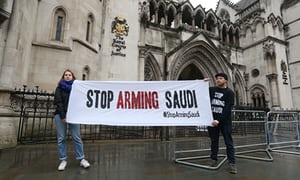Although Saudi Arabia’s seat on the United Nations (UN) Human Rights Council does not expire until 2019, several British lawyers have recently launched a campaign calling for the kingdom’s removal from the Council. The two lawyers, Rodney Dixon QC and Lord Kenneth Donald John Macdonald said that the removal of Saudi Arabia would “act as a major lever for the [Saudi] government to clean up [its] act and make a proper new start,” referencing the kingdom’s poor human rights record.
Among the criticisms leveled by the lawyers concerned Saudi Arabia’s role in the war in Yemen, where conflict has been raging for three years between the Houthis and the Saudi-backed forces of President Abd-Rabbu Mansour Hadi. Since the conflict began, more than 10,000 have been killed. Saudi Arabia is responsible for over 5,000 of the casualties in Yemen through airstrikes. Saudi Arabia has also been responsible for a naval blockade that has sharply restricted the imports of much needed humanitarian and commercial supplies like food and basic medicine. Largely as a result, one-third of Yemen’s population is facing a man-made famine, at least one million people have been affected by a cholera outbreak, and there have been rising concerns over diphtheria and malaria.
Among the thousands of civilian casualties caused by Saudi Arabia’s airstrikes, are hundreds of children. As a result, in 2016 the UN placed Saudi Arabia on a blacklist of countries responsible for killing children during wars. However, shortly after, former UN Secretary-General Ban Ki-moon decided to remove Saudi Arabia from the list. He later acknowledged that he took Saudi Arabia off the list because of pressure from the kingdom, which threatened to cut off funding to the UN. However, a report by Secretary General Antonio Guterres to the UN in 2017 found that in 2016 the Saudi-led coalition was responsible for 683 child casualties, which led to yet another placement on the draft blacklist. It was also found that they were responsible for 38 attacks on schools and hospitals.
Regardless of the fact that Saudi Arabia has committed numerous violations to international and humanitarian law, the United Kingdom (UK) has continued to supply Saudi Arabia with weapons. In May 2016, the UK denied that British-made cluster munitions were being used in Yemen, but Amnesty International provided evidence that the Saudi-led coalition was in fact using British-made bombs. However, the 2016 accusation has not stopped the UK from supplying arms to Saudi: in the first half of 2017, arms sales to Saudi Arabia rose to $1.5 billion. In July 2017, the Campaign Against Arms Trade brought a lawsuit to court attempting to force the UK to suspend arms exports to Saudi Arabia, but the High Court in London ultimately dismissed their case. Despite substantial evidence to the contrary, and despite UK and European Union arms sales rules, the Court ruled that the sales could continue as there was no “clear risk” that the weapons would be used in violation of international law.
There have been several attempts by member states of the Human Rights Council to introduce an international, independent, and impartial inquiry into the Saudi-led coalition’s actions in Yemen. The Netherlands, in particular, has been a leader in pushing for a resolution for an investigation into the human rights violations in Yemen by sending experts to the area. They were backed by seven European countries, however, in 2015 the Netherlands withdrew their resolution under serious Saudi pressure. In its place, a watered-down Saudi resolution was adopted, which only asked the UN to “provide technical assistance and to work with the government of Yemen, as required, in the field of capacity building.”
Following the Saudi resolution, the Saudis launched the Joints Incidents Assessment Team (JIAT) which is responsible for reviewing alleged human rights violations in Yemen. As a coalition-controlled body, JIAT has failed to investigate coalition abuses in an impartial manner. Instead, out of hundreds of airstrikes, including dozens that have struck hospitals, markets, and refugee camps, the JIAT has only investigated a handful while clearing the coalition of culpability in its own human rights violations.
More recently, in September 2017 a new Dutch-Canadian resolution was submitted to the UN Human Rights Council. While it was weaker than anticipated due to Saudi efforts, it passed. On 4 December 2017, the UN High Commissioner for Human Rights Zeid Ra’ad Al Hussein appointed Kamel Jendoubi, Charles Garraway, and Melissa Parke to the newly created Group of Eminent Experts on Yemen.
Saudi Arabia has consistently attempted to stall, halt, or divert actions in the United Nations to take steps to address widespread human rights abuses in Yemen. It forced the Secretary General to remove it from a children’s rights violators list despite well-documented accounts of violations. It has also stymied and watered down Human Rights Council resolutions. As a member of the Council, Saudi Arabia has a responsibility to uphold international standards and norms of human rights. Because of its refusal to accept this responsibility, its presence on the panel is “contradictory and ironic” as Dixon and Macdonald say.
McKenna Holman is an advocacy intern at ADHRB





